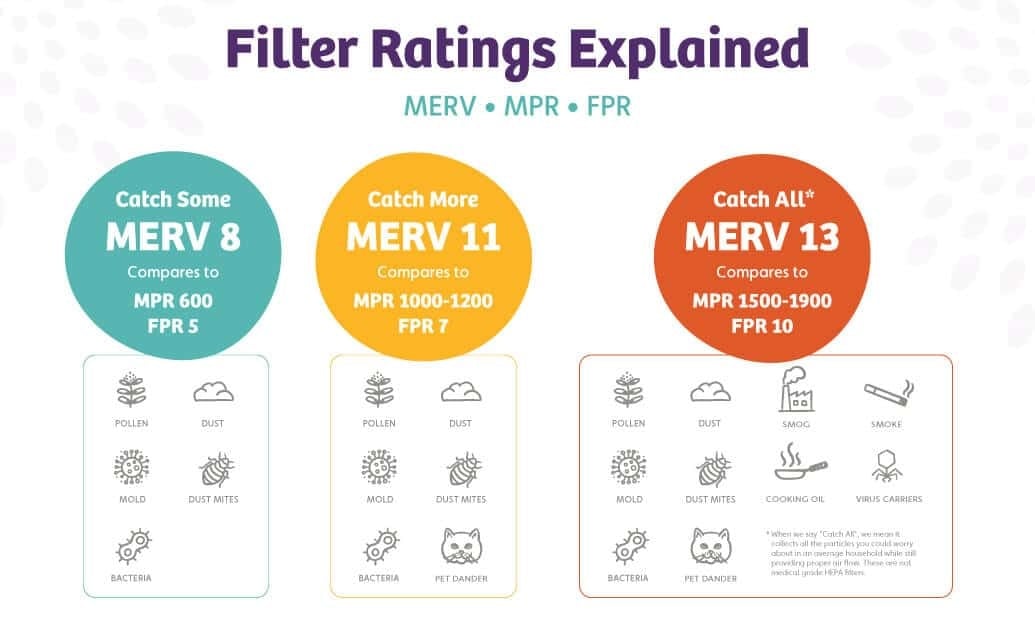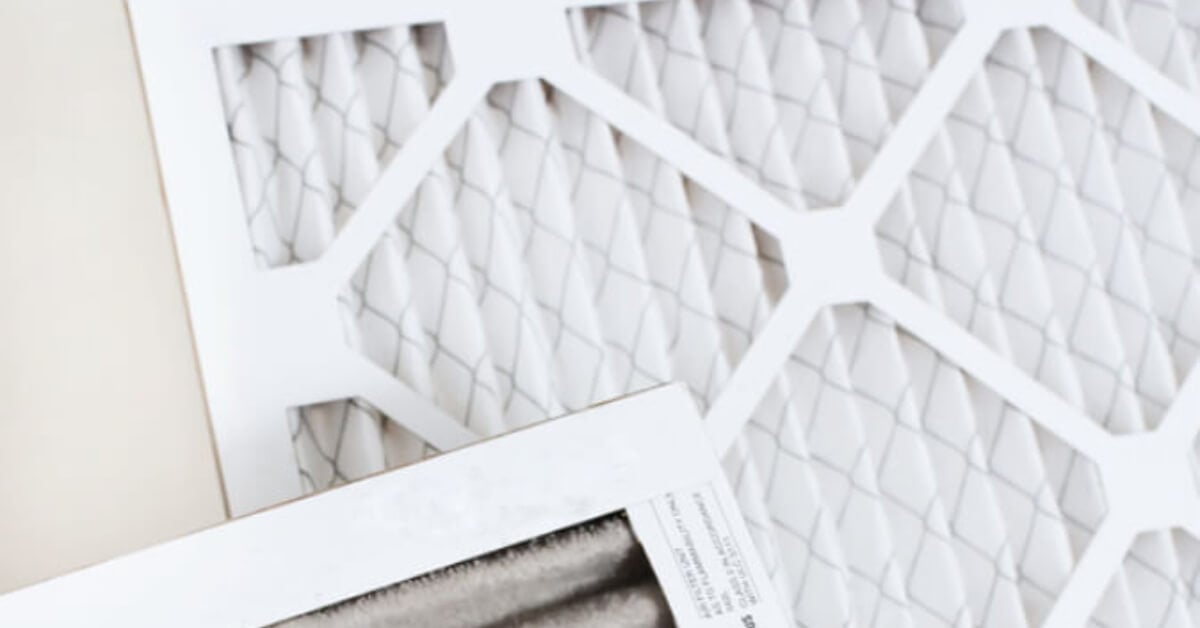How will a higher-quality filter impact the airflow to my HVAC unit.
The short answer is that it can, but it's not really an issue except under extreme circumstances. Most modern HVAC systems have no problem working with higher MERV filters, which is why millions of homeowners depend on them. The primary risk with high-efficiency air filters comes from them being left unchanged for long periods of time. If you stay on top of changing your filters, It's unlikely you'll experience any filter-driven issues with your HVAC system.
You want to achieve a nice balance
Like everything in life and nature, we want to strive for an ideal balance. In this case, you want to have your air as clean as possible without restricting the airflow to your HVAC unit and wasting energy. Some could compare the situation to the fairy tale of Goldilocks and the Three Bears. This home has less than clean air but is energy efficient, this home has fresh air, but an inefficient HVAC, and this home is just right! Although it is not that straightforward and there are other factors to consider, do not worry! We are here to help you make the best decision for your home!
Get to know a filter's quality
Before making any choices, one must first understand the quality of a filter. Any air filter you purchase will have a grade on it as a tool to show its quality. The most common measurement scales that you will find are MERV, MPR, and FPR. For this blog, we will be referring to the MERV (Minimum Efficiency Reporting Value) rating scale but it can easily translate to other measurement scales that you may see used.

The higher the rating of the filter is, the smaller the particles that it will capture as well as the higher the percentage of particles captured. Low-efficiency filters typically lie within MERV 1-4 and high-efficiency filters are MERV 13 and beyond. The scaling of MERV is not linear; the difference between a MERV 6 and a MERV 8 is nearly double in the percentage of particles captured. Be aware that as the MERV rating increases, the filter gets more restrictive and it will take more pressure and energy to push air through.
Low-efficiency filters
These filters will maximize your airflow but will do very little when it comes to cleaning your air. Filters in this category can sometimes be referred to as "rock-catchers" because their job is to make sure that nothing too significant and devastating gets sucked up into the HVAC unit as the bare minimum. They will stop the large debris, but the majority of other particles will be free to enter your HVAC unit. The dust and dirt will either land somewhere in the system or circulate back into the house. Dust and dirt on critical parts of your HVAC system will increase demand on your system, which can lead to repair and maintenance bills that you’re not looking to pay. Also, particles being circulated back into your home is just plain unhealthy. These filters are certainly better than no filter at all, but that is not saying much.
Ironically, the effectiveness of low-efficiency air filters increases as the filter loads up with dirt and dust. There are two problems, though. First, it takes time for the filter to be loaded enough to get a beneficial effect so that everything that gets by the filter ends up either in your system or back in your home. Second, eventually, the filter can become so dirty that the system experiences a pressure drop which can burn out the fan motor. To prevent this, you have to change the filter, which takes you right back to the first problem. For the brief time that you get a small benefit from your low-efficiency filter is far outweighed by the problems it creates.
So why use them? The main reason is that some older units can only handle these filters. A couple of decades ago, filters of lower quality were nearly the only kind used for homes. Technology for HVAC units has progressed since and most modern units of the last few years should be capable of a MERV 8 filter at the least. But older units may not be capable of enough air pressure to force air through a higher efficiency filter. Trying so could cause significant issues as well as a need for repairs.
Some HVAC technicians have a preference for these low-efficiency filters due to their low resistance to airflow. When these filters get dirty and need to be changed, air will still be able to flow through them and not clog as easily. Some technicians are anticipating that people will forget to change out their filters and using low-efficiency filters regularly could help minimize damage to a neglected HVAC. Filters of this category are recommended to be changed every two to four weeks, which can be challenging to maintain for some. It may be comforting to know that your overdue filter is not as bad as it could be, but it is not doing anything else for you until it is replaced.
High-efficiency filters
A more efficient filter will be more effective at removing particles from the air as they enter your HVAC system. They will improve the air quality in your home as well and keep your lungs happy. Since the filtration is more thorough, it will take more energy and effort from your HVAC unit to use them. How much more can vary by home and HVAC system, but with modern technology, the increase in airflow resistance that you get with a high-efficiency filter is typically marginal. This is important to note, because many homeowners believe the relationship is simply linear, meaning as filtration efficiency increases, so does resistance to airflow at the same rate. This is not accurate, though, and it's the reason why millions of homeowners use high-efficiency filters with no concern. For example, Second Nature's Essential filter is roughly 450% more effective at capturing particles than a cheapo low-efficiency fiberglass filter, but its resistance to airflow is only about 20% higher, a marginal difference.
An important note with a higher MERV filter is that you need to remember to change it. A consequence of a very effective air filter is the speed with which it can load with pollutants and begin to increase pressure drop. This is just fancy talk for "the filter catches more stuff so it clogs faster." If you leave a clogged filter unchanged for a long time, that's when you can start to see issues with resistance to airflow. This is, of course, a very easy issue to prevent. Just remember to change the filter and you're good to go.
In summary
So which filter should you consider? If your unit is older and/or very sensitive with airflow, use a filter that ranks from MERV 1 up to possibly MERV 6. If you want your air to at least be cleaned and handle dust, mold, pollen, and bacteria, then a MERV 8 will do the job. Having pets would require a MERV 10 to manage their dander, which tends to have smaller particles than the pollutants previously discussed. Air filters that are MERV 13 and higher are recommended for those that prioritize air quality and may have to handle asthma, severe allergies, and other similar circumstances. Try to not go beyond what you need for your situation. Otherwise, it would be a waste of energy, money, and give unneeded stress to your HVAC system. The factors of every home can vary, so you can always contact a local HVAC technician if you are ever unsure and want a second opinion.
The cost-benefit equation is simple: For a few extra dollars, you can ensure that your HVAC system is as clean as possible and the air in your home is effectively filtered just by using an efficient air filter that is changed regularly. It's an easy task that Second Nature makes even easier.
Topics:




